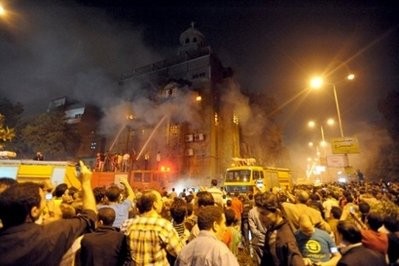Egypt's prime minister Sunday called a crisis cabinet meeting and delayed a Gulf visit after Cairo clashes between Muslims and Christians killed nine people, hurt at least 100 and left a church ablaze.
"Prime Minister Sharaf has called for an emergency meeting of the cabinet to discuss the regrettable events in Imbaba," Ahmed al-Saman, a cabinet spokesman told the official MENA news agency.
Sharaf "has decided to postpone his visit to Bahrain and the United Arab Emirates" which had been scheduled for Sunday, state TV reported.
The clashes late Saturday in the Cairo working class neighbourhood of Imbaba left nine dead and more than 100 injured, according to medics and officials.

State TV said that six Muslims and three Copts had been killed. A parish priest, Father Hermina, had told AFP on Saturday that at least five of the dead were Copts.
The area in Imbaba has been sealed off and security has been stepped up around key churches in the country, senior security official Mohsen Murad told state TV.
The two camps had clashed on Saturday after Muslims attacked the Coptic Saint Mena church to free a Christian woman they alleged was being held against her will because she wanted to convert to Islam.
Egypt's mufti -- the government's chief interpreter of Islamic law -- Ali Gomaa condemned the clashes and said they "were toying with Egypt's national security."
The violence could not have been caused by "religious people who understand their religion, whether Muslim or Christian," he told MENA late on Saturday.
Outside the church in Imbaba, military police had parked several armoured cars to block off Muslim protesters.
They fired their guns into the air as Christians in front of the church and Muslim protesters down the street hurled stones at each other. The Muslim protesters threw firebombs, one of them setting an apartment near the church on fire.
Coptic protesters scuffled with soldiers, blaming them for not doing enough to protect them.
The soldiers advanced at Muslim protesters who edged closer to the church, firing over their heads to repel them. Special forces were later deployed outside the church.
Elsewhere in Imbaba, Muslim protesters threw firebombs at another church, setting it on fire, police officials said. They said the fire was put out.
At one of the cordons outside the St Mena church, Muslim protesters said they were first fired upon by the Copts, after they tried to find a Christian woman they say converted to Islam and was being held inside.
The injured, who suffered from fractures and gunshot wounds, were taken to four city hospitals, medical officials said.
Copts account for up to 10 percent of the country's 80 million people and they complain of discrimination, and have been the targets of fairly regular sectarian attacks.
Claims that Christian women who converted to Islam were kidnapped and held in churches or monasteries have soured relations between the two communities for months.
Egypt's military rulers had warned on May 1 of strong measures against anyone inciting sectarian strife, in a bid to ease tensions between Muslims and Christians.
The Supreme Council of the Armed Forces, which took power after president Hosni Mubarak's ouster in February, said it was "exerting all efforts to end sectarian disagreements on the Egyptian street to protect this nation."
The statement came after a series of Muslim-Christian clashes and amid the growing public presence of Salafis -- a puritanical Islamist sect -- since the fall of Mubarak after a wave of mass protests.
The Salafis have held protests outside the Coptic Church's headquarters in Cairo to demand the release of two women they alleged were being held after converting to Islam. The church denies the women converted to Islam.
The claim was picked up by an Al-Qaeda-linked group in Iraq that massacred dozens of Christians in a Baghdad church in November 2010 and vowed more attacks until the two women were freed.
Two months later, a suicide bomber killed more than 20 people outside a church after a New Year's Eve mass in Egypt's coastal city of Alexandria.
























